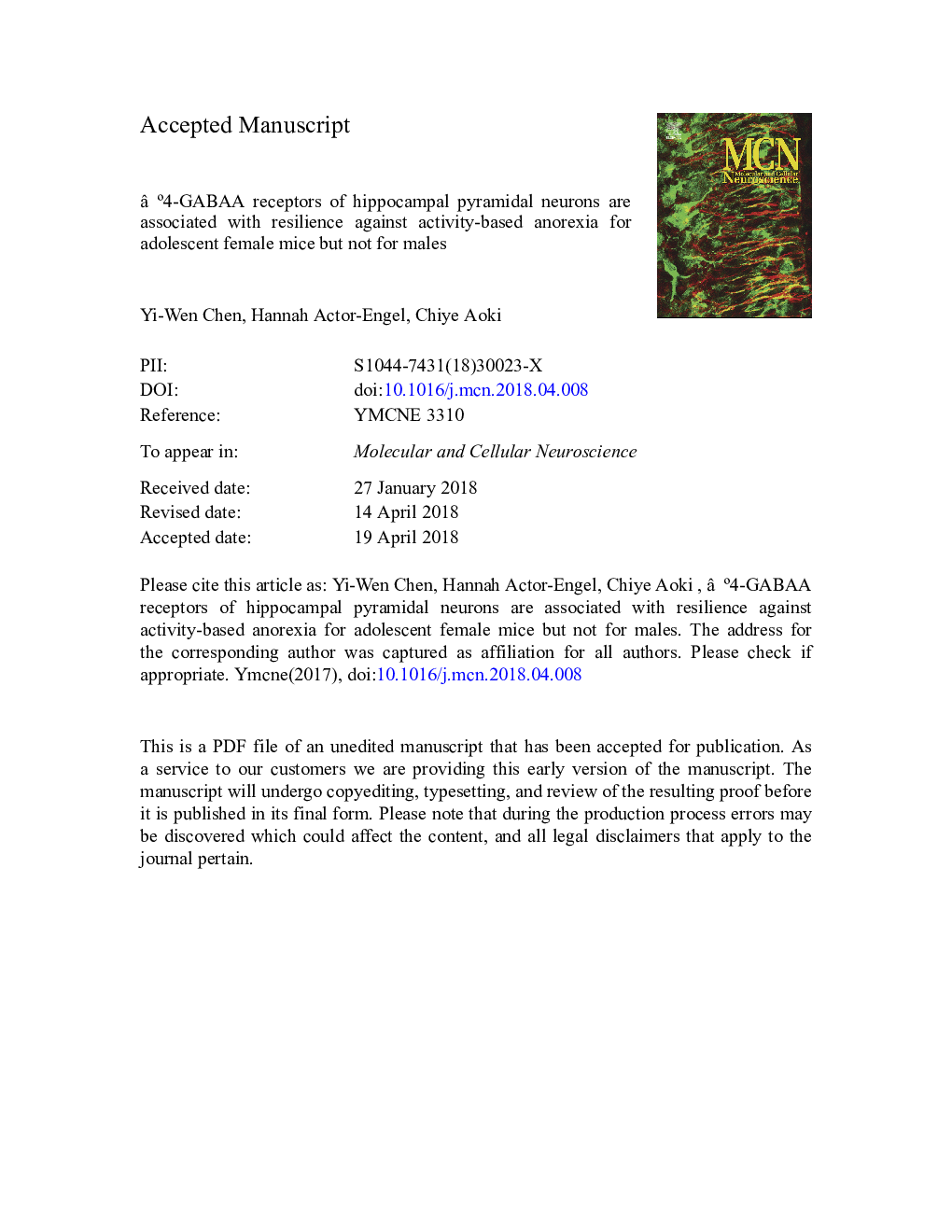| کد مقاله | کد نشریه | سال انتشار | مقاله انگلیسی | نسخه تمام متن |
|---|---|---|---|---|
| 8478348 | 1551116 | 2018 | 69 صفحه PDF | دانلود رایگان |
عنوان انگلیسی مقاله ISI
α4-GABAA receptors of hippocampal pyramidal neurons are associated with resilience against activity-based anorexia for adolescent female mice but not for males
دانلود مقاله + سفارش ترجمه
دانلود مقاله ISI انگلیسی
رایگان برای ایرانیان
کلمات کلیدی
ABAFAAElectron microscopic immunocytochemistryBDNF - BDNF یا فاکتور نورونزایی مشتقشده از مغز Anxiety - اضطرابResilience - انعطاف پذیریActivity-based anorexia - بی خوابی مبتنی بر فعالیتAnorexia nervosa - بیاشتهایی عصبیSex difference - تفاوت جنسیSIG - خودشانBrain-derived neurotrophic factor - فاکتور نوروتروفی مشتق شده از مغزfood anticipatory activity - فعالیت پیشگیرانه غذاfood restriction - محدودیت غذاknockout - ناکاوتHippocampus - هیپوکامپ exercise - ورزش
موضوعات مرتبط
علوم زیستی و بیوفناوری
بیوشیمی، ژنتیک و زیست شناسی مولکولی
بیولوژی سلول
پیش نمایش صفحه اول مقاله

چکیده انگلیسی
Activity-based anorexia (ABA) is an animal model of anorexia nervosa, a mental illness with highest mortality and with onset that is most frequently during adolescence. We questioned whether vulnerability of adolescent mice to ABA differs between sexes and whether individual differences in resilience are causally linked to α4βδ-GABAAR expression. C57BL6/J WT and α4-KO adolescent male and female mice underwent ABA induction by combining wheel access with food restriction. ABA vulnerability was measured as the extent of food restriction-evoked hyperactivity on a running wheel and body weight losses. α4βδ-GABAAR levels at plasma membranes of pyramidal cells in dorsal hippocampus were assessed by electron microscopic immunocytochemistry. Temporal patterns and extent of weight loss during ABA induction were similar between sexes. Both sexes also exhibited individual differences in ABA vulnerability. Correlation analyses revealed that, for both sexes, body weight changes precede and thus are likely to drive suppression of wheel running. However, the suppression was during the food-anticipatory hours for males, while for females, suppression was delayed by a day and during food-access hours. Correspondingly, only females adaptively increased food intake. ABA induced up-regulation of α4βδ-GABAARs at plasma membranes of dorsal hippocampal pyramidal cells of females, and especially those females exhibiting resilience. Conversely, α4-KO females exhibited greater food restriction-evoked hyperactivity than WT females. In contrast, ABA males did not up-regulate α4βδ-GABAARs, did not exhibit genotype differences in vulnerability, and exhibited no correlation between plasmalemmal α4βδ-GABAARs and ABA resilience. Thus, food restriction-evoked hyperactivity is driven by anxiety but can be suppressed through upregulation of hippocampal α4βδ-GABAARs for females but not for males. This knowledge of sex-related differences in the underlying mechanisms of resilience to ABA indicates that drugs targeting α4βδ-GABAARs may be helpful for treating stress-induced anxiety and anorexia nervosa of females but not males.
ناشر
Database: Elsevier - ScienceDirect (ساینس دایرکت)
Journal: Molecular and Cellular Neuroscience - Volume 90, July 2018, Pages 33-48
Journal: Molecular and Cellular Neuroscience - Volume 90, July 2018, Pages 33-48
نویسندگان
Yi-Wen Chen, Hannah Actor-Engel, Chiye Aoki,